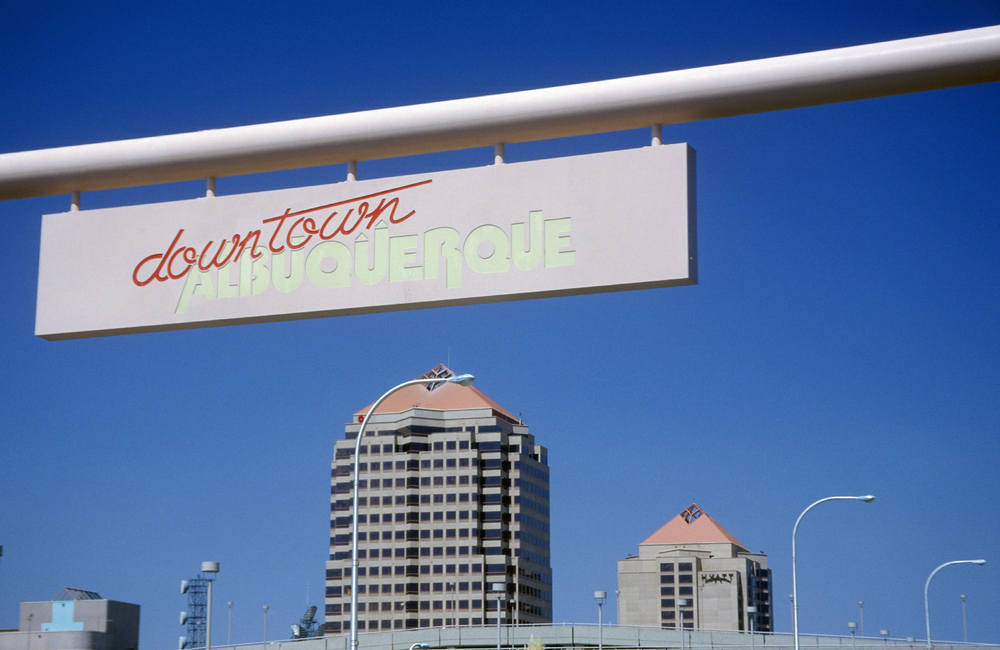Will Albuquerque’s Police Problems Arrest Its Economic Aspirations?

Albuquerque Mayor Richard Berry speaks to reporters Thursday April 10, 2014, after the U.S. Justice Department released a report in response to a series of deadly Albuquerque police shootings. Russell Contreras / AP Photo
Connecting state and local government leaders
New Mexico’s largest city wants to boost its innovation environment. But will negative headlines deter the mayor’s entrepreneurial ambitions?
ALBUQUERQUE — In November 2012, an article in Entrepreneur magazine quoted Republican Mayor Richard Berry touting the city’s business-friendly atmosphere: "Companies and entrepreneurs who have invested here applaud Albuquerque as much for its unique cultural attributes as for its business assistance, educated workforce, scientific centers and state universities.”
Last November, New Mexico’s largest city was featured in Forbes for its ambitious goal of becoming the nation’s most “entrepreneur-friendly city,” which mentioned the creation of Innovate ABQ, a brainchild of the University of New Mexico that is to involve the development of a downtown site where entrepreneurs, researchers and investors can collaborate.
But a public relations cloud hangs over this Southwestern city, which has been deluged by unfavorable media coverage of its beleaguered police department: “In Albuquerque, a city of five hundred and fifty thousand, the rate of fatal shootings by police is eight times that of New York City,” a recent article in the New Yorker stated.
Rolling Stone published a feature in January on the city’s police problems. The PBS News Hour aired a piece on the subject as well.
Since January 2010, Albuquerque cops have shot 42 civilians, 29 fatally. Not a single criminal charge against police had been issued until this January, when Bernalillo County District Attorney Kari Brandenburg filed murder indictments against two officers for the March 16, 2014, shooting death of James Boyd, a 38-year old homeless man with schizophrenia.
The U.S. Department of Justice recently concluded a two-year investigation with a report describing how the police department fostered a “culture that emphasizes force and complete submission over safety.”
In addition to the social and ethical issues associated with high-profile police cases in cities throughout the nation, there are major economic tolls at stake. Certainly, cities stand to lose when civil suits are filed against them: Since 1990, Oakland, California, has paid $74 million to settle more than 400 lawsuits; Albuquerque has paid some $23 million so far in settlements since 2010.
But the problems may also translate into arrested economic development, which is harder to quantify than the sum of legal settlements.
“The answer lies, in part, on how powerful the bad news is and whether there is offsetting good news,” Carol Coletta, vice president of community and national initiatives for the Knight Foundation, said in an interview. “For instance, most people had never heard of Ferguson [Missouri] before the police shooting. Now, the only thing people know about the town is the police shooting. If a similar thing happens in New York City—the chokehold [death of Staten Island resident Eric Garner], for instance—people focus on police brutality, but that’s not the single thing they associate with New York.”
Businessman Doug Turner, a 2010 Republican candidate for New Mexico governor, points to another city as a telling example: “Detroit still has a very high crime rate it is battling. But they’ve been crushing it with new start-ups and economic development efforts because the business community, the city and state have invested heavily in projecting a positive image—and that is overshadowing many of the city's negatives. They’ve been able to attract business despite the crime rate,” he said in an interview. “Optics and perceptions matter. There’s a national narrative out there. Does it impact perception? Absolutely! The impact on economic development is potentially very real. What are the perceptions of law enforcement, of crime in the city, of the city’s leadership and accountability? People need to perceive that positive change is taking place.”

(American Spirit / Shutterstock.com)
The actual police problems aside, Albuquerque has been working rigorously on redefining its identity, producing signs of a potentially vibrant local startup community with Innovate ABQ and other endeavors.
Stuart Rose is the founder of two local business incubators, The BioScience Center and FatPipe ABQ. “In the start-up world, I don’t really think [the negative publicity] has much impact,” he said in an interview. “But, of course, we do want to attract businesses to the city and where it might have an impact is that the negative press has perhaps kept Albuquerque off the list of cities companies may be considering in the first place.”
Jerry Szatan agrees. The principal of a Chicago-based location strategy and site selection firm has been consulting for manufacturing plants, distribution centers, headquarters, research and development labs and similar facilities throughout North America for more than three decades.
“At the beginning of a site search, I ask my clients two things: what are the precise needs for your facility? And, then, where should we look and are there specific areas to exclude or include? Image counts then,” Szatan explained in an interview. “At the end of the search, I narrow things down to a handful of communities based on a variety of stats and info and data. These places are all about tied in my estimation for what the client needs, but it can sometimes come down to subjective input at that point, such as a negative front page headline in the local paper.”
Additionally, the dynamics of site location searches are shifting with enormous demographic changes.
“Economic development has become as much about growing, attracting and retaining talent as it is about growing, retaining and attracting employers,” Mark Lautman, local economic architect and author of When the Boomers Bail: A Community Economic Survival Guide, said in an interview. “Communities vying for new job creation projects are increasingly having to prove to senior management and their site selection consultants that they can grow, attract and retain talent faster and better than the other places they are competing with. Recent national publicity about Albuquerque’s police problems last year surely hurt the city’s quality profile for recruiting companies—and talent. Those problems need to get fixed—and I hope they do.”

Lautman added that from a public relations perspective, the city’s profile had already been under attack from “decades of nationally-syndicated COPS reruns and the Breaking Bad series.” But, “in time, a series of well-documented stories about how the city fixed our policing problems will repair much of the PR damage. The bigger, more important problem to tackle is not the police training and management issues or even repairing the PR damage. Our problem is that we have significantly higher crime rates than the communities we compete with, more serious gang activity and poorer performing public schools. The hard work and money being invested to develop Albuquerque's image as ‘a place of choice’ for qualified millennials will earn diminishing returns unless accompanied by substantial, sustained progress on our crime and education metrics.”
The millennial generation, which outnumbers the 78-million-strong Baby Boomers, faces a considerably bleaker economic future. Its members have been pegged as more socially conscientious than its predecessors.
A native of San Francisco, 33-year-old Lee Ann Ratzlaff moved to Albuquerque from Portland, Oregon, in 2010, and has since become active in local bicycling advocacy. She works at the University of New Mexico’s Center for Behavioral Health, where many of her colleagues joined thousands in high-profile protests after video of the James Boyd shooting last March was released.
“The city did contract the center I work for to do an assessment on mental health services last year, and found a huge lack of services for the homeless,” she said. “One of the biggest issues that I've had since moving to Albuquerque is the lack of development in the downtown area. They recently redeveloped the 4th Street Mall, but it seems like it was primarily because of the homeless population and drug use in that area, and not because they wanted to improve anything in a meaningful way. The recent eviction of [a makeshift homeless camp] exemplifies their approach to some of our cities’ most vulnerable. The police have a really bad rap for a reason and it's not like they try very hard to engage community members or enforce laws that would actually help make our city safer.”
John Cordova, president of Cordova Public Relations, has a relatively broad perspective on the city’s tenuous position.
Prior to starting his firm, which has consulted for some of the largest private enterprises in Albuquerque, Cordova worked for the city, overseeing initial federal applications for urban renewal in the mid-1960s, which helped clear out decaying buildings downtown to make room for a convention center, the iconic Hyatt hotel, civic plaza and others. He also headed Albuquerque’s Model Cities Program, spearheading efforts to improve communities adjacent to downtown.
“Unfortunately, there has been an outmigration of residents from New Mexico, and Albuquerque has been slower than most communities to recover from the national recession,” Cordova said. (A recent study by UNM’s Bureau of Business and Economic Research ranked New Mexico 48th of the 50 states in terms of economic and job growth.)
“The crime and the homelessness issues have festered here. On top of this, the police problem will drive new businesses away as they factor in other issues such as education and aging infrastructure,” he said. “Tourism will certainly be affected as will the convention business.”
While acknowledging that the current mayor inherited a police force that has been poorly managed and populated with “rejects from other departments,” Cordova feels that community leadership remains in a “state of denial” regarding the problems and slow to support reform efforts.
The following statement was issued by Mayor Berry for this and other news sources:
No one likes or wants bad press for their communities – yet all cities receive it from time to time. Our goal in Albuquerque should be to write our own story instead of letting others write it for us. The best way to do that is to work together to face our challenges head on, which is what we are doing. We live in a wonderful city with a rich history and a bright future and we need to build our city up rather than letting outsiders and those in our very own community tear it down.
Cordova said he was “stunned at the audacity of the statement” in view of problems that “can’t wait for Albuquerque to construct a new narrative. Economic development depends on a firm grasp on reality and not hopeful public statements,” he said. “Governing and managing cities is about spending money and launching efforts to address change for the better. Mere photo-op governance in the face of problems including the police, homelessness, a dysfunctional public education system and aging infrastructure will not affect change.”
In the meantime, the U.S. Justice Department report lists numerous reforms to address the issues within the Albuquerque Police Department. An independent monitor has been assigned to oversee these reforms, which are expected to take several years, at an estimated annual cost to taxpayers of between $4 and $6 million.
The reforms for the police department might be a first step, but whether that will allow Albuquerque’s leaders to change the conversation and focus on an innovation agenda will take time to see through.
“In order for the APD situation to be reformed, Albuquerque leaders will have to see their issues as vulnerable,” Cordova said. “Change that is needed will require a wholesale house cleaning. At the present time leadership seems to be satisfied spouting platitudes and supporting efforts that are grandiose with insufficient funding. Albuquerque's future will depend on a vision that addresses the vulnerability that bad publicity creates.”

NEXT STORY: Where You Can Legally Smoke Marijuana in the Nation's Capital


